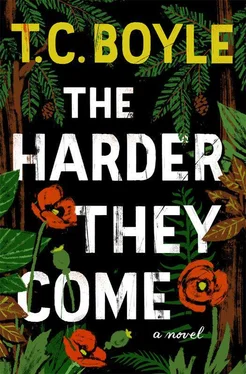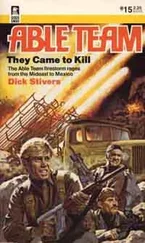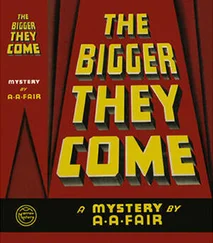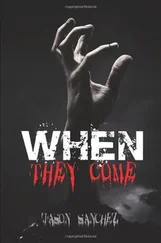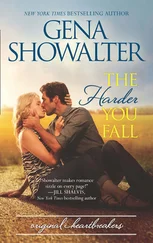It wasn’t ideal, far from it. She’d rather have him there, rather be making coffee for two instead of one — and eggs and toast and whatever else he wanted. The house felt empty without him, though he’d been in it no more than what, twelve, thirteen hours? It saddened her. Standing at the counter in the kitchen that still vibrated with the aura of him, she poured herself a cup of coffee and gazed out the window to where a hummingbird no bigger than her thumb was sucking sugar water from the feeder through the miniature syringe of its bill, a creature innocent of cops, internal combustion engines, wages, taxes, slavery. A free bird, a free bird on the land. She blew on her coffee to cool it and told herself to be patient — one way or the other he’d get tired of it out there and then he’d be back, she was sure of it.
Just give him time.
COLTER DIDN’T HAVE THE shits. They probably didn’t even have giardia back then, let alone the little yellow 400 mg metronidazole tablets they gave you to cure it. What they did have was hostiles, thousands of them, maybe hundreds of thousands, though the white race had done their best to bring those numbers down, what with smallpox and gonorrhea and rum, whiskey, vodka and gin. But here they were, the Blackfeet, terminally furious and flinging Potts’ bloody genitalia at him, and the only issue was not if but how they were going to put him to death. Braves kept lurching up to him, right in his face, tomahawks drawn, then jerking back again, as if to rattle him, but he kept calm because he saw that some of the higher-ranking ones, the chiefs, had withdrawn a ways to sit around in a circle and think things through. Why be hasty? They had all day, all night, and if he lasted that long, the day after that. He felt his heart sink, though he wouldn’t let his face show it. After a while the ululations dropped off and the young braves, the hotheads, held back in deference to their elders, but you could see they were aching for the moment they’d be set free — and gloating too over the prospect of what mold of sport the elders were devising for them.
Naked, with Potts’ blood drying on his chest and shoulders, Colter stood rigid, trying to focus his mind. He could make out something of what the elders were saying — some were for the death of a thousand slits, others for making a target out of him so they could improve their aim the way they had with Potts, maybe even take wagers as to which of them could drill him the closest without killing him outright. He had enough of their language to get a sense of all this, but not enough to plead his case — if he was doing anything at that moment it was trying to form the Blackfoot words in his head, when only the language of their enemies, the Crows, or Kee-kat-sa, as they called themselves, would rise up out of the depths of his brain, which was, understandably, under a whole lot of stress at the moment.
Finally, one of the chiefs — tall, bleak-faced, with reddened mucousy eyes and skin jerked by the wind and sun — pushed himself up and ambled over to stand face-to-face with him, practically nose-to-nose. Colter could smell him, the tobacco he sucked through his pipe, the sweat of his horse, the dried buffalo meat and pounded meal he’d had for breakfast. They stood like that for a long moment, Colter naked and vulnerable and wanting only to sprout wings and fly on out of there, the hardest thing to keep your back straight and not give in to the impulse to protect your gut — a reflex, really — and guard against a sneak blow that would double you up and leave you gasping in the dirt. “Are you a fast runner?” the chief asked, but Colter didn’t understand him, so after a long moment, the chief repeated himself and he got the gist of it. This was hope. A particle of it, anyway. He’d heard of similar situations, in which a tribe would let their captive run for his life so they could have the sport of the chase, like fox and hounds, except that the ground was festooned with prickly pear and the fox had no moccasins to protect his feet and even if he did there was nowhere to escape to or even hide in all that flat deserted plain.
And what did Colter say, in his accent that must have been a kind of insult in itself? “Not really.”
The chief bored into him with his rheumy eyes, wondering if he could believe him — or should — or if it even mattered. Even if Colter was the fastest man alive, how could he hope to outrun a hundred or more hopped-up spear-flinging braves, each of them vying to be the one to avenge the death of their tribesman, their friend, their relative, their father or son or brother? After a minute or two of this — enough to make Colter feel the extra weight of paranoia, wondering if the chief had been there for the fight with the Crows and was just now beginning to place him — the chief turned his back on him and returned to the circle of elders. Things got quiet. Children stared at him out of wide unblinking eyes. A dog came up to sniff him and raise its hackles before slinking away. The elders were talking in low voices now, as if they’d reached consensus, and he strained to hear what they were saying but couldn’t catch a word of it.
Another eternity went by, every minute of it precious, however fraught, because he was alive still and thinking and breathing and pumping blood on planet earth. He just stood there, staring straight ahead, as if he didn’t care one way or the other what they did with him. It was cool still, the temperature just above freezing despite the sun that had come up over the horizon now, but he didn’t feel it — if anything, he felt overheated, as if he were wrapped in furs and lying in front of a bonfire. Maybe he had an itch on the back of his neck or under his arm — people had itches all the time — but he didn’t dare scratch it or even move a fraction of an inch. Finally, the first chief, joined now by a younger, angrier-looking one, strolled across the beaten dirt to him, taking his sweet time. He was nodding, nodding assent, and when he was right there in front of Colter again, nose-to-nose, he said, “You go out there on the plain and then”—he gestured to the young braves, who’d begun to remove their leggings and line up for the chase—“we see how fast you run.”
So Colter, taking his sweet time too, ambled out across the plain, expecting at any moment to hear the shout go up behind him but forcing himself to walk so as to get as much distance between himself and his pursuers as he could before he broke into a run and set them off. Most people wouldn’t have had the presence of mind Colter had — they would have taken off sprinting and the Indians would have been on them quicker than flies on shit — but it served him well. He must have gotten a hundred yards out before the shout went up, but it wasn’t so much a shout as a mad blood-crazed shriek of three hundred voices, the women ululating all over again and the braves howling like beasts. Colter didn’t let it distract him and he didn’t look back. He knew right where he was — it was six miles straight across the plain to the forks of the Missouri, the big river, and if he could somehow reach that and maybe get in the water ahead of them and flail his way downstream he had a chance, the smallest, tiniest, infinitesimal chance, of surviving.
Colter ran. He kept his head down, watching his feet, trying to avoid the spines of the cholla and prickly pear and whatever else was out there. His legs felt strong, though he’d spent the better part of the past month sitting in a canoe, and he never slowed his pace, sprinting the first mile as if this wasn’t about endurance but speed, only that. The braves — and what had they been doing all their lives except letting their ponies do the running for them? — began to drop out, one by one. Those closest to him flung their spears at the pale retreating wedge of his back but they weren’t near enough to be accurate and he could hear the spears clatter on the stones behind him. Encouraged, he kept running, and if anything, increased his speed.
Читать дальше
